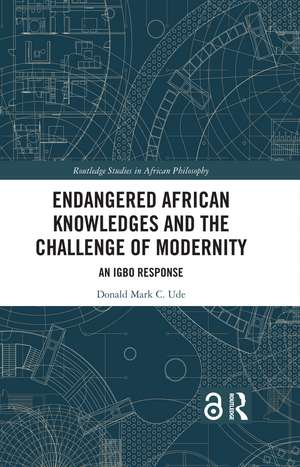Endangered African Knowledges and the Challenge of Modernity: An Igbo Response: Routledge Studies in African Philosophy
Autor Donald Mark C. Udeen Limba Engleză Hardback – 2 apr 2024
This book argues that theorizing modernity requires a critical conversation between African and Western scholarship, in order to unpack its links with coloniality and the subjugation of Africa’s indigenous knowledges. In setting out this discussion, the book also connects with Latin American scholarship, demonstrating how the modern world is structured to marginalize and destroy knowledges from across the Global South. This book draws on Igbo epistemic resources of solidarity thinking, positioned in contrast to capitalist knowledge-patterns, thereby providing an important Africa-driven response to modernity and coloniality. This book concludes by arguing that the Igbo sense of solidarity is useful and relevant to modern contexts and thus constitutes a vital resource for a less disruptive, more balanced, and more wholesome modernity.
At a time of considerable global crises, this book makes an important contribution to philosophy both within Africa and beyond.
Preț: 1004.68 lei
Preț vechi: 1225.22 lei
-18% Nou
Puncte Express: 1507
Preț estimativ în valută:
192.25€ • 198.33$ • 160.43£
192.25€ • 198.33$ • 160.43£
Carte tipărită la comandă
Livrare economică 26 martie-09 aprilie
Preluare comenzi: 021 569.72.76
Specificații
ISBN-13: 9781032705682
ISBN-10: 103270568X
Pagini: 228
Dimensiuni: 156 x 234 x 14 mm
Greutate: 0.58 kg
Ediția:1
Editura: Taylor & Francis
Colecția Routledge
Seria Routledge Studies in African Philosophy
Locul publicării:Oxford, United Kingdom
ISBN-10: 103270568X
Pagini: 228
Dimensiuni: 156 x 234 x 14 mm
Greutate: 0.58 kg
Ediția:1
Editura: Taylor & Francis
Colecția Routledge
Seria Routledge Studies in African Philosophy
Locul publicării:Oxford, United Kingdom
Public țintă
Academic and PostgraduateRecenzii
“The book insightfully succeeds in pointing out that solidarity in Igbo society, and in Africa more widely, is a mode of perceiving the world, a ‘social imaginary’. As such, it may provide, so the argument goes, the much-sought-after epistemic resources to counteract and redress the disruptive effects of Africa’s modernization.”
Toon Braeckman, Professor of Philosophy (emeritus), KU Leuven, Belgium
“This book adeptly articulates a response to the challenge of modernity, drawing on Igbo (African) epistemic resources. The author demonstrates an exceptional grasp of global politics of knowledge. Scholars working on African philosophy, African studies, postcolonial/decolonial studies, and related fields will find it greatly useful.”
Edwin Etieyibo, Professor of Philosophy and Chair of the Department of Philosophy, University of Witwatersrand, South Africa
Toon Braeckman, Professor of Philosophy (emeritus), KU Leuven, Belgium
“This book adeptly articulates a response to the challenge of modernity, drawing on Igbo (African) epistemic resources. The author demonstrates an exceptional grasp of global politics of knowledge. Scholars working on African philosophy, African studies, postcolonial/decolonial studies, and related fields will find it greatly useful.”
Edwin Etieyibo, Professor of Philosophy and Chair of the Department of Philosophy, University of Witwatersrand, South Africa
Cuprins
Introduction: What Is at Stake 1. Africa and the Challenge of Modernity 2. Understanding Modernity, Its Systems, and Imaginaries: Habermas, Taylor, and Wallerstein 3. The Epistemic Ramifications of Modernity: Coloniality, Decoloniality, and Subaltern Epistemologies 4. The Idea of Interconnectedness in Igbo Thought: Society, Politics, Religion, and Morality 5. Solidarity and the Challenge of Modernity. Conclusion: Birthing "Other Modernities" From Endangered Knowledges.
Notă biografică
Donald Mark C. Ude studied in Nigeria, Kenya, Canada, and Belgium. He has a PhD in Philosophy from KU Leuven (2021), where he currently researches and teaches. He is a recipient of a number of coveted research fellowship awards, notably FWO (Belgium) and Humboldt (Germany). His articles have featured in Theory, Culture & Society, Philosophy Today, South African Journal of Philosophy, and several important journals. He maintains an active research interest in African philosophy, African studies, postcolonial/decolonial studies, critical theory, social/political philosophy, modernity, and post-secularism. At freer moments, he writes on topical socio-political issues in Nigerian newspapers.
Descriere
This book presents an innovative African philosophical response to coloniality and the attendant epistemicide of Africa’s knowledge systems, drawing on Igbo thinking.













